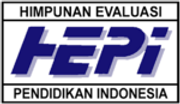Improving Cognitive Development of Students by Reading Corner Program in Elementary School level
Abstract
Keywords
Full Text:
PDFReferences
Akbar, Aulia. (2017). Membudayakan Literasi dengan Program 6M di Sekolah Dasar, JPsd (Jurnal Pendidikan Sekolah Dasar), 3 (1), 51.
Antoro, Billy. (2017).. Gerakan Literasi Sekolah dari Pucuk Hingga Akar (Sebuah Refleksi). Banjarmasin: Direktorat Jenderal Pendidikan Dasar dan Menengah Kementerian Pendidikan dan Kebudayaan.
Arimbi, Yurike Dwi, Sri Saparahayuningsih, Mona Ardina. (2018). Meningkatkan Perkembangan Kognitif Melalui Kegiatan Mind Mapping. Jurnal Ilmiah Potensia, 3 (1), 65.
Bujuri, Dian Andesta. (2018). Analisis Perkembangan Kognitif Anak Usia Dasar dan Implikasinya dalam Kegiatan Belajar Mengajar. Literasi: IX (1), 38.
Handayani, Adisyahputra, A., dan Indrayanti, R. (2018). Cor-relation Between Integrated Science Process Skills, and Ability to Read Comprehension to Scientific Literacy in Biology Teachers Students. Biosphere: Jurnal Pendidikan Biologi, 11(1), 22-32.
Hanggi, Olovia Herlina. (2016). “Tiga Perubahan Kecil dalam Literasi Sekolah.” Membumikan Gerakan Literasi di Sekolah. Yogyakarta: Lembaga Ladang Kata.
Heriawan, Adang, Reksa Adya Pribadi. (2018). Bahasa Kita dan Pendidikan Kita. JPsd (Jurnal Pendidikan Sekolah Dasar), 4 (2), 155.
Hernowo, ed. (2003). Quantum Reading: Cara Cepat dan Bermanfaat untuk Merangsang Munculnya Potensi Membaca. Bandung: Mizan Learning Center.
Ibda, Fatimah. (2015). Perkembangan Kognitif: Teori Jean Piaget. Intelektualita, Volume 3, No-mor 1, Januari-Juni, 2738.
Latifa, U. (2017). Aspek Perkembangan pada Anak Sekolah Dasar : Masalah dan Perkembangannya. Jounal of Multidisciplinary Studies, 1(2), 185–196.
Juhanda and Maryanto, Y. (2018). The Emergence of Biological Problems in Electronic School Books (BSE) Class X Reviewed from The Scientific Knowledge Domain of Scientific Literacy. Biosfer: Jurnal Pendidikan Biologi, 11(2), 121-125.
Mualimah, Eka Nurul, and Usmaedi. (2018). Pengaruh Kebiasaan Membaca Terhadap Prestasi Belajar Bahasa Indonesia Peserta Didik Kelas V SDN Kubanglaban. Jurnal Pendidikan Sekolah Dasar, 4 (1), 46.
Pamungkas, Aan Subhan. (2017). Pengembangan Bahan Ajar Berbasis Literasi pada Materi Bilangan bagi Mahapeserta didik Calon Guru SD. JPsd (Jurnal Pendidikan Sekolah Dasar), 3 (2), 229.
Rahmania, Miarsyah, dan Sartono. (2015). The Difference Scientific Literacy Ability of Student Having Field Independent and Field Dependent Cognitive Style. Biosphere: Jurnal Pendidikan Biologi, 8(2), 27-34.
Ristanto, Zubaidah, Amin, dan Rocman. (2017). Scientific Literacy of Students Learned Through Guided Inquiry. International Journal of Research and Review, 4 (5), 23-30.
Suyono, Harsiati, dan Wulandari. (2017). Implementasi Gerakan Literasi Sekolah pada Pembelajaran Tematik di Sekolah Dasar. Sekolah Dasar: Kajian Teori dan Praktik Pendidikan, 26 (2), 116-123.
Triyanti, H., & Hidayah, N. (2018). Implementasi Program Gerakan Literasi Sekolah (GLS) ditinjau dari Tahap Pengembangan di SD Unggulan Aisyah Bantul. Fundamental Pendidikan Dasar, 1(1), 35-39.
Budi Harjo, Badrun Kartowagiran, A. M. (2019). International Journal of Instruction. International Journal of Instruction, 12(4), 149-166.
Heitmann, P., Hecht, M., Scherer, R., & Schwanewedel, J. (2017). Learning Science Is About Facts and Language Learning Is About Being Discursive— An Empirical Investigation of Students ’ Disciplinary Beliefs in the Context of Argumentation. Frontiers in Psychology, 8(June), 1-24.
Latifa, U. (2017). Aspek Perkembangan pada Anak Sekolah Dasar : Masalah dan Perkembangannya. Jounal of Multidisciplinary Studies, 1(2), 185-196.
Triyanti, H., & Hidayah, N. (2018). Implementasi Program Gerakan Literasi Sekolah (GLS) ditinjau dari Tahap Pengembangan di SD Unggulan Aisyah Bantul. Fundamental Pendidikan Dasar, 1(1), 35-39.
Vandenbroucke, L., Spilt, J., Verschueren, K., Piccinin, C., & Baeyens, D. (2018). The Classroom as a Developmental Context for Cognitive Development : A Meta-Analysis on the Importance of Teacher–Student Interactions for Children's Executive Functions, 88(1), 125-164. https://doi.org/10.3102/0034654317743200
Wang, A. (2016). Exploring the impact of teacher experience on questioning techniques in a Knowledge Building classroom. Journal of Computers in Education, 4(1), 27-42. https://doi.org/10.1007/s40692-016-0057-2
Zee, M., & Bree, E. De. (2016). Students’ self-regulation and achievement in basic reading and math skills: the role of student-teacher relationships in middle childhood. European Journal of Developmental Psychology, 5629(June), 1-16. https://doi.org/10.1080/17405629.2016.1196587
Wulanjani, Arum Nisma, Candra dewi Wahyu Anggraeni. (2019). Me-ningkatkan Minat Membaca melalui Gerakan Literasi Membaca bagi Peserta didik Sekolah Dasar. Proceeding of Biology Education, 3 (1), 26-31.
Yuliana Rina, Isah Cahyani, dan Andoyo Sastromiharjo. (2015). Penerapan Strategi Partisipatif Melalui Media Gambar Denah dan Kartu Pancing Foto dalam Pembelajaran Pemahaman Konsep dan Berbicara Peserta didik Sekolah Dasar (Pra-Eksperimen pada Kelas IV SDN Layungsari 1 Kota Bogor). JPsd (Jurnal Pendidikan Sekolah Dasar), 1 (2), 3.
Yuriza, Adisyahputra, A, dan Sigit. (2018). Correlation Between Higher Order Thinking Skills and Level of Intelligence with Scientific Literacy on Junior High School Students. Biosfer: Jurnal Pendidikan Biologi, 11(1), 13-21.
DOI: https://doi.org/10.18326/mdr.v12i1.18-32
Refbacks
- There are currently no refbacks.
Copyright (c) 2020 Maratul Qiftiyah

This work is licensed under a Creative Commons Attribution 4.0 International License.

This work is licensed under a Creative Commons Attribution 4.0 International License.
Program Studi Pendidikan Guru Madrasah Ibtidaiyah (PGMI)
Universitas Islam Negeri (UIN) Salatiga, Indonesia
Jl. Lingkar Salatiga Km. 2 Pulutan, Sidorejo, Kota Salatiga, Jawa Tengah 50716,
Telp. (0298) 323706 – Fax. (0298) 323433
Technical Support: jurnalmudarrisa@iainsalatiga.ac.id
P-ISSN: 2085-2061
E-ISSN: 2541-3457



